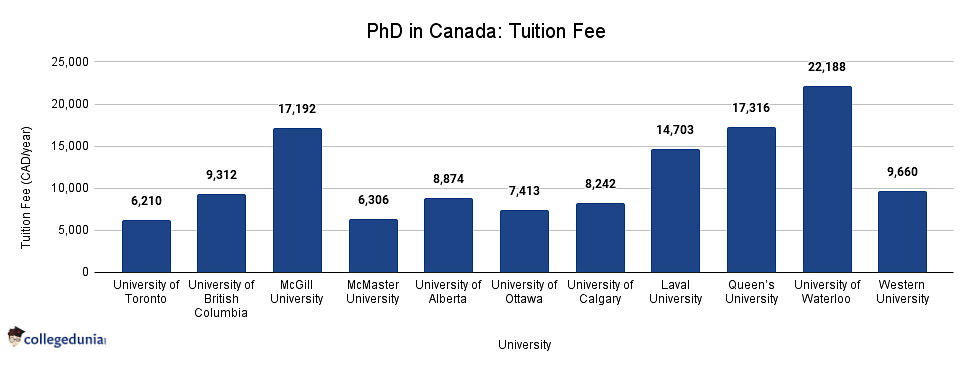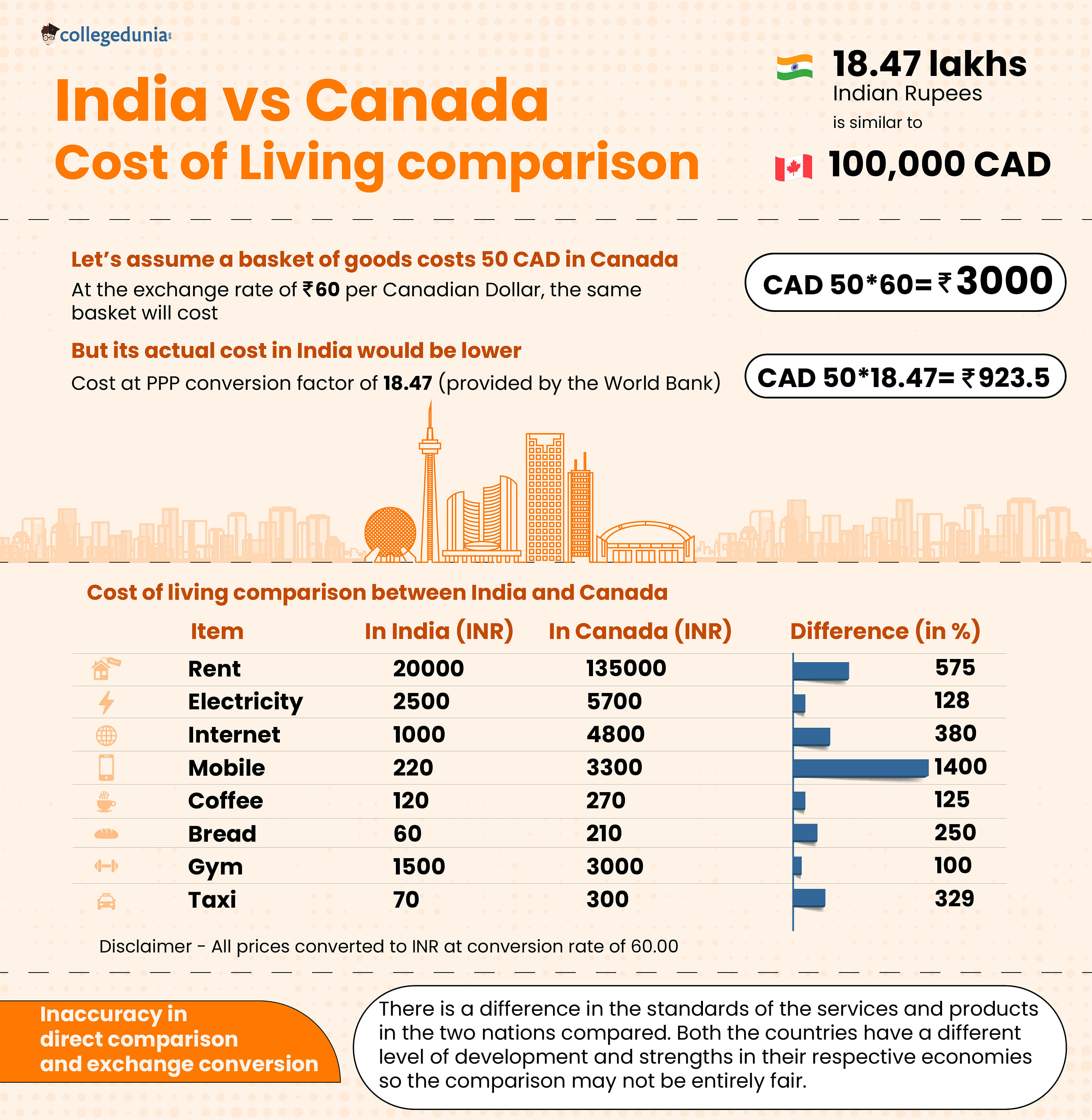Ph.D. in Canada allows international students to profit from the high-tech education and placement facilities offered at Canadian universities and work with leading experts. There are countless research opportunities in Canada to look out for as an international student after completing a PhD in Canada. International applicants looking for pursuing the course must note that the degree lasts from 3-6 years. Both professional (Doctorate in Business Administration) and academic doctorate (Ph.D. in sciences and more) courses are available to choose from when pursuing higher education in Canada.
The cost of pursuing a Ph.D. degree in Canada will vary depending on the university and the availability of Teaching Assistantships (TAs) and Research Assistantships (RAs). However, compared to the cost of a Ph.D. in the US or UK, the cost of a Ph.D. in Canada can be quite affordable, starting at around 6,000 CAD (3 lakhs INR) per year. As an Indian student, the cost of tuition and living expenses can range from 3-10 lakhs per year, with an additional 5.7 lakhs for travel expenses. Alongside TA/RAs, there are various Ph.D. scholarship in Canada that you can take advantage of. Post completion of your Ph.D. in Canada, you will be allowed to stay back for almost three years on a PGWP (postgraduation work permit). With a doctorate degree from Canada, you can earn as much as 140,000 CAD (85 lakhs INR) per year.
Ph.D. in Canada: Highlights
| Duration | 3-6 years |
| Research Universities | 100+ |
| Academic Year | September to April |
| Fees | 6,000 to 22,000 CAD (3 lakhs to 13 lakhs INR) |
| Funding up to | Up to 40,000 CAD (24 lakhs INR) a year |
| Work-study opportunities | 10 hours a week |
| PGWP duration | At least 3 years |
| Average Salary | 90,000 CAD (55 lakhs INR) |
Top PhD universities in Canada
Listed below are top PhD universities in Canada as per their Times Higher Education rankings 2023 along with the fees of pursuing PhD programs in Canada:
| THE Rankings 2023 | Top Universities | Fees (CAD/year) |
|---|---|---|
| #18 | University of Toronto | 6,210 |
| #40 | University of British Columbia | 9,312 |
| #46 | McGill University | 17,192 |
| #85 | McMaster University | 6,306 |
| #118 | University of Alberta | 8,874 |
| #137 | University of Ottawa | 7,413 |
| #201-250 | University of Calgary | 8,242 |
| #251-300 | Laval University | 14,703 |
| #251-300 | Queen’s University | 17,316 |
| #201-250 | University of Waterloo | 22,188 |
| #201-250 | Western University | 9,660 |
| #251-300 | Simon Fraser University | 6,075 |
| #301-350 | Dalhousie University | 6,714 |
| #301-350 | University of Victoria | 7,920 |
| #351-400 | University of Manitoba | 8,622 |
PhD Universities in Canadian Provinces
There are 10 provinces in Canada and three territories, most provinces take a similar approach to doctoral training and international recruitment. However, policies can sometimes affect the amount (and type) of funding available to international students pursuing their doctorate from a specific province. The part of Canada you choose to study in may also determine whether your university offers programs in English, French, or both. Check out the links below to find some of the universities to pursue doctorate in various Canadian provinces:
Why Study PhD in Canada?
Studying in Canada is now far beyond just a trend, the multicultural, welcoming society, and supportive government norms encourage students from abroad to study with Canadian Universities. What attracts students to pursue the highest achievable degree at Universities, Ph.D., in Canada are the factors given below:
- World-renowned universities: Around 3-4 universities in Canada make it to the top 150 list across the world. These top-ranking universities in Canada offer you cutting-edge research facilities and educators with the best academic knowledge.
- Post-study opportunity: You can stay back for up to three years through PGWPP after completing your Ph.D. in Canada. It also paves your path to obtaining a Canadian PR.
- Affordability: The fees of pursuing Ph.D. in Canada range from 6,000 to 22,000 CAD (3 lakhs to 13 lakhs INR). This is a lot lesser when compared with study destinations like the USA and UK.
- Scholarships: The number of scholarships for Ph.D. in Canada for international students is humungous. Some of the popular scholarships are Ontario Trillium Scholarships, Vanier Canada Graduate Scholarships, Ontario Graduate Scholarships, and more. Some of these scholarships offer 15,000 to 40,000 CAD a year.
- Work-study opportunities: Ph.D. students in Canada can work for around 10 hours per week during term time. This allows you to fund and sustain your daily expenses while learning and gaining industry experiences.
Ph.D. in Canada: Course Structure & Highlights
- Most Ph.D. programs in Canada require a minimum of three years of full-time study and research, but it is often seen that it takes students more than three years to wind-up their PhDs. The maximum duration by which you must have completed your Ph.D. in Canada is six years.
- Ph.D. in Canada is usually completed under the supervision of at least one academic supervisor. By the end of the course, you are required to submit a substantial doctoral thesis. This will be submitted to a set of examiners who will then consider and read through your research work.
- Further to this, your Ph.D. proceeds to an oral defense, where you will cross-question the topic of your research and you may be expected to have a presentation ready to explain your work to them. Your overall performance and thesis will help you in obtaining your Ph.D. degree.
Cotutelle Programs
A collaborative or co-tutored route to a Ph.D. in Canada is the Cotutelle Program. In these courses, students usually spend working time at two universities both of which analyze, supervise, and award the Ph.D. project.
This may seem similar to Joint Ph.D. degrees but, this arrangement is usually specific to a student's project instead of university partnerships (as is the case with Joint Ph.D.). The availability of the Cotutelle Program is based on each university in Canada and applicants must discuss in detail their university before applying for a Ph.D. course in Canada.
Popular PhD programs in Canada
Some of the popular courses that international students choose to pursue during their Ph.D. in Canada are:
| Stream | Number of PhDs Available | Popular Universities |
|---|---|---|
| Natural Sciences & Mathematics | 58 | U of T, McMaster, McGill, UAlberta, University of Calgary |
| Social Sciences | 51 | U of T, UAlberta, University of Montreal, McMaster University |
| Humanities | 28 | U of T, McMaster, McGill |
| Medicine & Health | 34 | U of T, UBC, McGill, uOttawa, University of Alberta, University of Calgary |
| Business & Management | 23 | UBC, McGill, UAlberta, University of Calgary |
| Engineering & Technology | 18 | U of T, University of British Columbia, McGill, uOttawa |
| Computer Science & IT | 13 | U of T, McMaster, McGill |
| Agriculture & Forestry | 14 | U of T, UAlberta, University of Montreal |
| Applied Sciences | 5 | UBC, U of T, McGill, uOttawa |
| Environment and Earth Sciences | 14 | U of T, University of Waterloo |
How to Apply for Ph.D. in Canada?
The admission procedure for applying for a Ph.D. in Canada varies from university to university. Having mentioned this, there are still certain factors that apply to all the Canadian universities offering Ph.D. to international students. Let us dive into the details of getting admission to Candian universities as Ph.D. aspirants.
- Decide the type of Ph.D. course you want to pursue
You can either choose structured or open Ph.D. courses in Canada. In Structured Ph.D., the research outlines are set by the university itself. For an Open Ph.D., you need to suggest and outline your research project by yourself.
For either of the two courses, you need to identify a supervisor who will guide you through the research process. Once you have a supervisor, some universities may ask for a letter of support from your supervisor along with your applications.
- Submit research outline
If you choose to do an open Ph.D. in Canada, submit a research proposal describing the outline of your project and its importance in current times. The proposal must be prepared in accordance with the research guidelines of the chosen university.
- Apply online and submit relevant documents
Make your applications online with the choice of university, pay the application fees and submit the required documents. Some of the documents that universities ask for when applying for Ph.D. courses are:
- Academic transcripts
- SOP
- Results of language tests- IELTS/TOEFL
- Two to three LORs: You should try including one LOR from your supervisor, to enhance your chances of getting accepted
- CV
- Portfolios (in case of creative work-field)
- Sit in for your interview
Some Canadian universities may ask you to sit for an online/virtual interview before offering you admissions.
- Get your Study Permit
Once accepted by the university, you must apply for getting a Canadian study permit. To get your study permit you must have the following documents ready:
- Health insurance and medical certificate
- Proof of sufficient funds
- Acceptance letter from a DLI
- Language proficiency scores- IELTS/TOEFL
- The intent of leaving back to home country
Eligibility for Ph.D. in Canada
- Have a master's degree with good academic standing and proven ability and potential for research.
- With a strong GRE score, in some cases, GMAT scores are also accepted.
- Proof of language proficiency:
- IELTS- 6.5 (band score no less than 6.0)
- TOEFL: 100 (iBT) with 22 in writing, 600 (pBT) with 5.0 TWE.
In rare cases, you can get accelerated admissions with Ph.D. in Canada, without a master's degree. In this case, you will be required to have outstanding grades in your last two years of bachelor’s degree or demonstrate potential through research publications.
PhD in Canada: Costs
The cost of studying abroad is one of the major contributing factors towards the choice of university and location for an international student. The overall cost for international students comprises not only the tuition and living expenses but also of the expenses that he/she makes before leaving the home country. The overall costs of studying in Canada are discussed below:
Ph.D. fees in Canada
This section discusses PhD fees in Canada in some of the Canadian universities:

| University | Tuition Fee (CAD/year) | Tuition Fee (INR) |
|---|---|---|
| University of Toronto | 6,210 | 3.79 lakhs |
| University of British Columbia | 9,312 | 5.69 lakhs |
| McGill University | 17,192 | 10.51 lakhs |
| McMaster University | 6,306 | 3.85 lakhs |
| University of Alberta | 8,874 | 5.42 lakhs |
| University of Ottawa | 7,413 | 4.53 lakhs |
| University of Calgary | 8,242 | 5.04 lakhs |
| Laval University | 14,703 | 9 lakhs |
| Queen’s University | 17,316 | 10.58 lakhs |
| University of Waterloo | 22,188 | 13.56 lakhs |
| Western University | 9,660 | 5.90 lakhs |
Note: For many of its doctoral courses, the University of Toronto has made the tuition fees for international students equivalent to the tuition fees for domestic students, making it extremely cost-efficient for them to pursue their Ph.D. at University of Toronto.
Cost of Living in Canada
The cost of living in Canada depends on various factors. Some of the decisive factors include the province of study, accommodation type, lifestyle, etc. Given below is a table detailing the expense of living in Canada:
| Expense Type | Average Cost (CAD) | Cost Equivalent (INR) |
|---|---|---|
| Accommodation | 1,037 | 62,465 |
| Food | 290 | 17,471 |
| Transport | 107 | 6,446 |
| Internet | 80 | 4,819 |
| Books and Supplies | 163 | 9,818 |
| Miscellaneous | 310 | 18,673 |
There are various other expenses that you will be spending on. Overall the Canadian government requires international students to have around 10,000 CAD (6 lakhs INR) a year if they wish to pursue higher education in Canada.

Ph.D. Scholarship in Canada
When you plan your budget and the limit exceeds the best solution to this situation is to get a scholarship that can help you cover major expenses. Some of the popular PhD scholarship in Canada available to international students are:
| Scholarship | Eligibility | Awards (CAD) |
|---|---|---|
| Ontario Trillium Scholarship | Apply for Ph.D. at partner universities Academically meritorious | 40,000 a year (renewable for 4 years) |
| Ontario Graduate Scholarship | Apply for Ph.D. program at universities in Ontario | 15,000 |
| Robert Hartog Graduate Scholarship | Ph.D. at University of Waterloo | 5,000 (renewable) |
| UAlberta Izaak Walton Killam Memorial Scholarship | Enroll in research program at UAlberta | 45,000 (for two years) |
| University of Manitoba Graduate Fellowship | Ph.D. course at University of Manitoba | 18,000 per year |
| Vanier Canada Graduate Scholarship | Ph.D. in the field of social science, engineering, humanities, health or natural sciences | 50,000 per year |
| UBC four-year Doctoral Scholarship | Doctoral students at UBC | 18,200 per year (stipend) |
| Pierre Elliott Trudeau Foundation Doctoral Scholarship | Research programs in social science or humanities | 40,000 |
| Ontario Graduate Fellowship | Research with partner universities | 12,000 (renewable) |
| Hira and Renu Ahuja International Graduate Scholarship | Research in engineering fields at University of Waterloo | 20,000 |
There are many more scholarships to explore. You must contact the university and look for all the funding options available for doctoral aspirants. Some universities like Brock University offer a complete financial cover to its international doctorate aspirants through fellowships allowing them to pursue the degree nearly free of any cost.
Other Funding Opportunities for Ph.D. in Canada
- Teaching/Research Assistantship: In research assistantships, you help a faculty member (can be your supervisor) by assisting them with data collection, lab organizations, report writing, analysis, and more. Teaching assistantship involved teaching one or more course sections, conducting lab experiments to support your department's undergraduate programs. You can apply for TA/RA through your department website. The stipend offered varies from university to university.
- Work-Study: You can work for 10 hours per week with a study permit while your Ph.D. in Canada is ongoing. The salaries for part-time work opportunities are set by the government to ensure that minimum wages are offered to each individual.
Scope of Ph.D. in Canada
Ph.D. in Canada opens up new horizons for a student. From teaching opportunities to indulging in research work with industry giants, these are the options available to you after completing your Ph.D. in Canada. The jobs you choose or research sector you opt for will depend on the specializations of your project, hence, the salaries offered are also different based on your choices. Having said that, we can still look into the salaries offered to doctoral students at some of the popular universities in Canada.
| University | Average Salaries (CAD) |
|---|---|
| University of Toronto | 136,000 |
| University of British Columbia | 150,000 |
| McGill University | 150,000 |
| McMaster University | 176,000 |
| Queen’s University | 102,000 |
| University of Waterloo | 247,000 |
| Western University | 377,000 |
Note- Salaries are given above are the upper band offered to students.
Some of the popular research profiles and their respective salaries offered to the graduates of Ph.D. in Canada are listed below:

| Job Role | Average Salaries (CAD) | Average Salaries (INR) |
|---|---|---|
| Research Scientist | 81,000 | 50 lakhs |
| Postdoctoral Research Associate | 48,000 | 30 lakhs |
| Assistant Professor | 98,000 | 60 lakhs |
| Data Scientist | 92,000 | 56 lakhs |
| Medical Writer | 66,000 | 40 lakhs |
| Research Engineer | 74,000 | 45 lakhs |
| R&D Director | 151,000 | 92 lakhs |
| Physicist | 82,000 | 50 lakhs |
Explore: Post-Study Work Visa in Canada
You can stay back in Canada for up to three years with your PGWP and gain valuable experience after completing your doctoral studies by grabbing jobs in Canada. This experience and skill can later be used for obtaining a permanent residency in Canada. Pursuing a doctoral degree from Canada and having worked in the sector will add more PR points to your application and enhance your chances of getting approved as a permanent resident.
FAQs
Ques. Is PhD cheap in Canada??
Ans. Yes, pursuing PhD in Canada costs around 6,000 to 22,000 CAD (3 lakhs to 13 lakhs INR), which is much affordable than various study abroad destinations such as USA or UK. Additionally, you can also manage to study PhD in Canada by obtaining scholarships covering tuition fees and living expenses.
Ques. Is GRE required for Ph.D. in Canada?
Ans. A GRE score may be required for pursuing Ph.D. in Canada. This requirement is highly dependent on the choice of university.
Ques. Do Ph.D. in Canada students get paid?
Ans. Yes, there is a slight stipend offered to Ph.D. students in Canada. However, the stipend majorly offers basic support and the amount is relatively low. Hence, if you plan on relying on your stipend, it is time to rethink that decision and look for other alternatives.
Ques. Which country is best for pursuing Ph.D. abroad?
Ans. Some of the top countries for pursuing a Ph.D. are Australia, Germany, Japan, Canada, and Russia.
Ques. What is the requirement for Ph.D. in Canada?
Ans. To study Ph.D. in Canada, you will need to have completed your master's degree with at least an A grade, have language proficiency scores (if required), submit GRE scores, and sit for an interview. Additionally, if you choose an open Ph.D., you will also need an outline of your research project.
Ques. What are the earnings of Ph.D. students in Canada?
Ans. On completion of your Ph, you can expect to earn anywhere from 70,000 CAD a year to 150,000 CAD (42 lakhs to 91 lakhs INR) a year or more. This will depend on your job role, sector of employment and location of employment.
Ques. What are the top universities for pursuing Ph.D. in Canada?
Ans. Some of the top universities to pursue Ph.D. in Canada are McGill University, University of British Columbia, University of Toronto, McMaster University, University of Calgary, University of Ottawa, etc.
![University of Toronto [U of T]](https://static.zollege.in/public/college_data/images/studyabroad/logos/college_104_25-12:44_University_of_Toronto-logo-2417C8AF32-seeklogo.jpeg?tr=w-50,h-50,c-force?tr=h-40,w-35,c-force)
![The University of British Columbia [Ubc]](https://static.zollege.in/public/college_data/images/studyabroad/logos/college_64_25-11:13_Capture.jpeg?tr=w-50,h-50,c-force?tr=h-40,w-35,c-force)
![McGill University [Mcgill]](https://static.zollege.in/public/college_data/images/studyabroad/logos/college_39_24-17:26_macgill.jpeg?tr=w-50,h-50,c-force?tr=h-40,w-35,c-force)
![University of Montreal [U de M]](https://static.zollege.in/public/college_data/images/studyabroad/logos/college_71_24-17:54_udem.jpeg?tr=w-50,h-50,c-force?tr=h-40,w-35,c-force)
![Simon Fraser University [Sfu]](https://static.zollege.in/public/college_data/images/studyabroad/logos/college_54_25-11:01_Capture.jpeg?tr=w-50,h-50,c-force?tr=h-40,w-35,c-force)
![University of Alberta [UAlberta]](https://static.zollege.in/public/college_data/images/studyabroad/logos/college_9_24-17:46_alberta-.jpeg?tr=w-50,h-50,c-force?tr=h-40,w-35,c-force)



1606454348.png?tr=w-305,h-145,c-force?tr=h-40,w-40,c-force)




1606454348.png?tr=w-305,h-145,c-force?tr=h-130,w-130,c-force)

1607424314.png?tr=w-305,h-145,c-force?tr=h-130,w-130,c-force)

